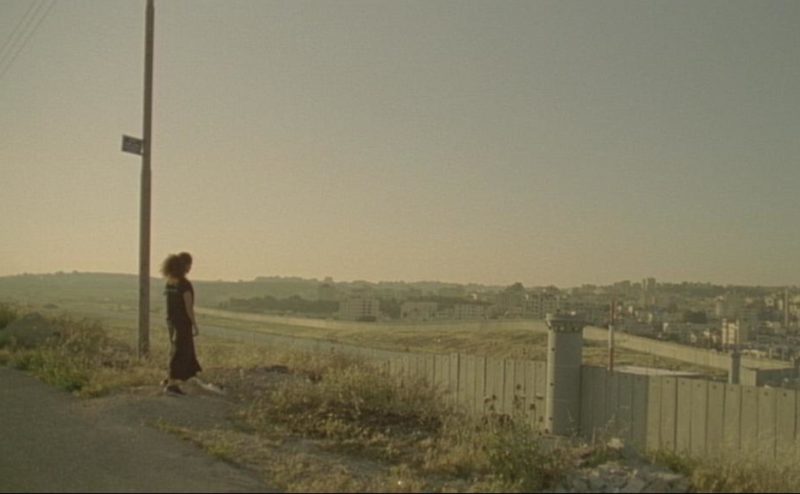
Film Analysis | Film Festivals | Filmmaking | Interviews | Massachusetts
Palestinian, Filmmaker, or Both?
Written by B. Walter Irvine | Posted by: NewEnglandFilm.com
On one of the last days of the Boston Palestine Film Festival, Mohammed Alatar, a director from the West Bank, put into the words what was perhaps the most obvious question of the event: “You need to settle the argument within you. Are you an artist who happens to be a Palestinian, or are you a Palestinian who wants to be an artist?” A few minutes later, I asked him how he would answer his own question. “I am a Palestinian,” he said without hesitation.
It was an issue that echoed throughout the festival, which ran October 1–10, with screenings at the Museum of Fine Arts, Harvard Film Archive, and Cambridge Public Library. Alatar, whose documentary Jerusalem: the East Side Story was screened during the festival, sees cinema as a means to express his pro-Palestinian activism. “I was always looking for tools to explain the misery. I still think cinema is the best way to do it,” he said. He is not alone; that same idea helped to inspire the Boston Palestine Film Festival.
Salma Abu Ayyash, curator and publicity coordinator of the festival, had been holding traditional political events for years with Tawassul, a local pro-Palestinian activist group she had co-founded, before helping to put the festival together for the first time in 2007. She had grown somewhat disillusioned with straightforward activism. “You can’t put up these stupid flyers and expect people to notice,” she said. “This is something that Palestinians have learned. We thought that by simply sitting there, people would recognize our just cause.” Now she sees film as a much better way to draw attention to the Palestinian situation.
More than simply draw attention, however, the medium of film gives artists a chance to change the narrative of the Palestinian experience. Early Palestinian filmmakers did the same thing, turning to cinema to change the discourse after the 1948 Arab-Israeli War. “They wanted to switch the image from refugees to freedom fighter,” Alatar explained. “We’re trying to get away from the image of the Palestinian as victim, and giving them more agency,” said Mahasen Nasser-Eldin, whose short documentary with Camilla Magin, From Palestine With Love, also screened. “We wanted to show another facet to Palestine and Palestinians that people in the west don’t have access to,” she said later.
The festival made it clear, however, that these priorities do not mean that Palestinian film is only activist or didactic. “We want to celebrate Palestinians as humans capable of producing,” said Abu Ayyash, and “the politics will come later.” In speaking through film as opposed to traditional political expression, the filmmakers focus on humanity and immediate experience first, before more abstract concepts of institutions and affiliations. Michel Khleifi, an acknowledged seminal figure in Palestinian cinema, said during a panel discussion, “If talking about the rapport between humans is political, then, yeah, I’m political.”
Khleifi’s newest work, Zindeeq, which opened the festival, evokes the sociopolitical context of the Israeli-Palestinian conflict, but it hardly provides a resolute message of any sort. Following a Palestinian filmmaker from Nazareth as he wanders around late at night in his hometown looking for a hotel and being turned away, the narrative of the film feels disjointed, a degree of misdirection and inconclusiveness purposefully programmed into it. The director himself acknowledges that the film is postmodern. While it certainly makes glancing reference to a few Palestinian themes like water and displacement, Khleifi didn’t define the movie solely in terms of politics, saying, “It’s an interrogation about the new status of picture in not only our culture, but also our subconscious.” The theme is developed in the film through a series of visions — hallucinations, dreams, memories, and even shots spliced in that seem to come from the protagonist’s own films, though no transition justifying their appearance in this movie connects them to the central narrative.
In person, too, Khleifi chose to remain ambiguous. At a Q&A after the screening of Zindeeq, an audience member asked him why no one would rent the protagonist a room, a haunting plot point in the film. “I don’t know,” the director replied. “Did he complete his journey?” someone asked later. “What do you think?” Khleifi asked in response. At the panel the next day, Nadia Yaqub, a professor who studies Arabic culture, told him, “You tell stories.” “I’m a liar,” he corrected her, smiling.
Even when discussing politics, Khleifi didn’t come across as divisive. He disapproved of what he saw as Israelis’ small-mindedness: “What’s tragicomic is that the Jews come to the Middle East and forgot all their urban experience, and they became like a small, closed tribe in Saudi Arabia.” But he’s harsh on his own people, as well: “We have no theatres in all of Palestine — we have no cultural centers. When people do, others call them bourgeois.” In the end, the filmmaker was almost impossible to imagine as a pedant or even a political figure.
Alatar, too, despite being an avowed activist, likes the idea of playing with indeterminacy. Describing a script he was writing, he painted a picture of an unresolved ending where a million Palestinians are marching to a checkpoint, but the screen fades to black. “They might slaughter us, or we might impose a new reality,” he said. He had his own trickster moments, too. “How do we tell your story?” a woman asked earnestly at the panel discussion. “I’m busy teaching myself. You’re on your own,” he said pleasantly.
In general, the Palestinian filmmakers have to face the same challenges that all filmmakers struggle with while trying to produce a motion picture. For one, they have to exploit existing tropes without making them seem cliché. As Abu Ayyash noted, Palestinian films “tend to have building blocks, including little boys running after armored trucks,” but “the question is: can you use those elements to put together something that comes out naturally?”
And just like any other filmmakers, they have to find a way to wrestle control of a movie to prevent it from becoming shapeless. Alatar studied film in Texas, so he has been influenced by the American style. “I find myself covering 20 subjects,” he said. “Nobody does that besides American filmmakers.”
In documentaries, Palestinian filmmakers are at the mercy of their material and need to find the footage that tells the story they want to tell. Nasser-Eldin’s documentary From Palestine With Love is about a young Palestinian dancer applying to school in Sweden to be with her boyfriend. The director was lucky in her choice of subjects, because “they’re all involved in cultural production, so they understand the need to get a sound bite.” But she could only do so much to get her point across: “I never direct the character I’m work with, I just give them dialogue points.” Even so, she said that many people tell her how much like a narrative film the documentary looks.
Of course, some challenges will always be particular to their time and place. Alatar was once shooting in the Old City in Jerusalem, and his shooting crews were always having run-ins with the police. A solution presented itself: “Our producer finally said, ‘Okay, we’ll send two crews: one to film and one to get arrested.’” In that moment, he was both a filmmaker and a Palestinian simultaneously.









